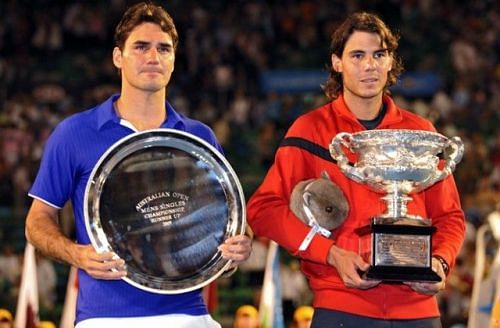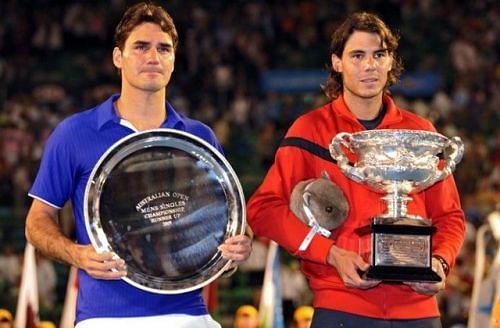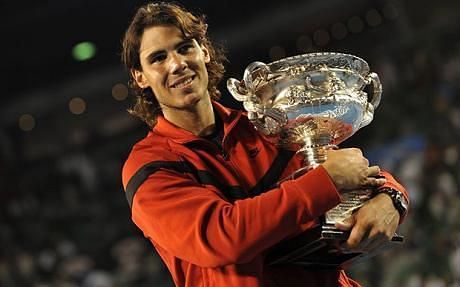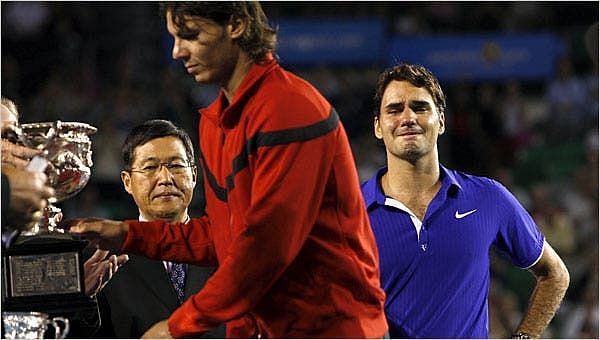
'Rafael Nadal told me he couldn't run' - Toni recalls Australian Open 2009 final

As part of Eurosports' "Players' Cut" series on Rafael Nadal, the Spaniard's uncle and long-time coach Toni Nadal spoke about the southpaw's 'hugely significant' win over Roger Federer at the 2009 Australian Open.
Toni Nadal recalled that following the bruising five-hour five-set semifinal win over Fernando Verdasco, Rafael Nadal was in no state to play the final.
"Rafa told me he could not run," Toni said.
Rafael Nadal's arms, shoulders and head were all hurting from the physical effort he exerted against Verdasco, and Toni recalled how his nephew needed special motivation to face Roger Federer in the final.
Eventually, Rafael Nadal prevailed over Federer in a thrilling five-set final to register his fifth win in seven Grand Slam finals against the Swiss. In the process, Rafael Nadal became the first Spanish player in the Open Era to win the Australian Open.
Rafael Nadal has since made to four other title matches at Melbourne Park, but has never managed to stand on the winner's podium again. In retrospect, that makes Nadal's 2009 win all the more important to his career and legacy - which Toni readily acknowledged.
"It was a very significant win for Rafael," Toni said. "The entire team was very happy for the achievement.
Toni Nadal also spoke of the 'incredible' moment when Federer broke down in tears and Rafael Nadal put a comforting arm around his arch-rival:
"I always want Rafael to win and become the champion. But I never want the opponent to be sad. I saw the moment when Federer was unable to talk and there were tears in his eyes. I felt very bad."
How did the 2009 Australian Open final between Rafael Nadal and Roger Federer unfold?

The then 22-year-old Rafael Nadal got past compatriot Fernando Verdasco in a pulsating five-set semifinal that ended during the early hours of Saturday. That took Rafael Nadal to his first hardcourt Grand Slam final, where he would lock horns with Roger Federer - just six months after their iconic Wimbledon 2008 match.
With the then three-time Australian Open champion Federer having seen off Andy Roddick in straight sets on Thursday, the Swiss was by far the fresher player for the Sunday final. The physical nature of Rafael Nadal's semifinal win meant there were serious question marks over the Spaniard's ability to be competitive against one of the best players to have played the sport.
Yet it was Rafael Nadal who made the first move. Nadal reeled off five of the last six games in the first set, and rode his momentum to break Federer for a 3-2 lead in the second. But the Spaniard failed to close out the set, and the then three-time Australian Open champion reeled off four consecutive games to restore parity.
An injured Nadal called for the trainer at 4-4 in the third. Upon resumption of play, Federer surged to a 0-40 advantage on the Spaniard's serve but failed to make the break.
Federer squandered two more break points at 40-15, with Nadal serving at 5-5, which proved to be the pivotal moment of the match. The Swiss saved a set point at 5-6 but made crucial unforced errors in the ensuing tiebreak as Rafael Nadal took a two sets to one lead.
Federer was always playing catch up after that. He managed to eke out the fourth set - which was a lot closer than the 6-3 scoreline suggests - but couldn't keep up with his younger opponent down the home stretch.
The duo traded holds to open the fifth set. But with exhaustion setting in, Federer dropped serve and Nadal opened up a 3-1 lead. The Swiss then saved two championship points at 2-5, but a long forehand on the third sealed Rafael Nadal's Australian Open title.
Aftermath of the 2009 Australian Open in the context of Rafael Nadal's career

The 2009 Australian Open win was Rafael Nadal's fifth in seven Grand Slam finals against Roger Federer, and a confirmation of his World No. 1 status. A tearful Federer paid rich compliments to Nadal for the win, saying:
"You deserved the win. You played a fabulous final."
Although Nadal would never win another Australian Open, his 2009 effort gave him the belief that he could challenge anyone on any surface. He went on to complete his Career Grand Slam at the US Open next year, and later added three more titles in New York to firmly establish his credentials as an all-time hardcourt great.